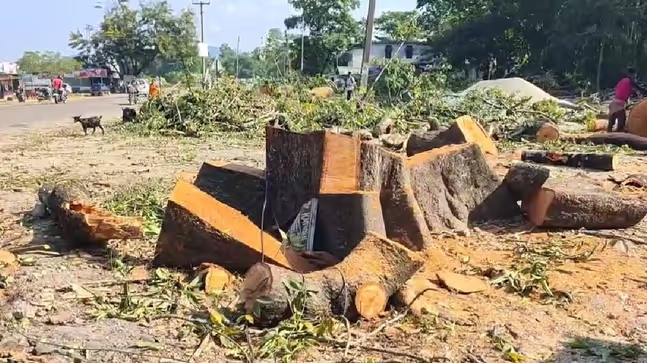The ongoing expansion of National Highway 17 into a four-lane road in Assam’s Bongaigaon district has raised alarms among environmentalists. As part of the project, century-old trees have been felled in the North Salmara area, triggering concerns about the long-term environmental impact. The expansion of the highway is a part of a larger infrastructure initiative aimed at improving connectivity across the region. However, the environmental consequences of the deforestation caused by this project have caused widespread outrage among local communities and environmental groups.
The destruction of these trees, many of which have stood for more than 100 years, has sparked significant debate. Local residents and environmentalists have raised concerns about the loss of biodiversity and the long-term ecological impact of such actions. These trees were not only part of the local landscape but also played a vital role in maintaining the region’s ecological balance by providing oxygen, shelter for wildlife, and contributing to the overall health of the ecosystem. Their removal for the purpose of road expansion is seen as a major loss to the natural heritage of the area.
Environmentalists are particularly concerned about the implications of this deforestation on the local flora and fauna. Many species of birds, insects, and small animals depend on these trees for food and shelter. The loss of such a vital habitat could lead to a decline in biodiversity, affecting not just the animals that live in the area but also the entire ecosystem that relies on a healthy and thriving environment. Additionally, the removal of these trees can lead to soil erosion, as the roots of the trees help to stabilize the soil, preventing it from being washed away during the monsoon season.
The expansion of the highway, while aimed at improving transportation and boosting regional development, has led to a conflict between progress and preservation. Supporters of the project argue that the road expansion will improve connectivity, reduce travel time, and boost economic activity in the region. They claim that the expansion is necessary to accommodate increasing traffic and facilitate better movement of goods and people. The road will connect several remote areas to major cities, which could contribute to the economic development of the region.
However, critics argue that the loss of trees and natural habitats should not be ignored in the pursuit of development. They emphasize the need for sustainable development practices that balance infrastructure expansion with environmental protection. Many environmental groups have called for the use of alternative methods to minimize the destruction of the natural landscape. Suggestions include rerouting the highway to avoid ecologically sensitive areas or implementing tree plantation initiatives to compensate for the loss of old-growth trees.
Local government authorities have stated that they are aware of the concerns raised by environmentalists and are working on mitigating the impact of the deforestation. They have assured the public that the expansion project will follow environmental regulations and guidelines, although many activists remain skeptical about the implementation of these measures. The lack of transparency and consultation with local communities during the planning stages of the project has also been a point of contention. Many believe that the voices of the people directly affected by the loss of these trees have not been adequately considered.
In response to the growing concerns, environmental groups have begun organizing protests and campaigns to raise awareness about the issue. They are urging the government to reconsider the project’s scope and to take more drastic measures to protect the environment. Their efforts have gained traction, with several prominent activists and organizations speaking out against the destruction of the trees.
The issue has also drawn the attention of national and international environmental organizations, who are now monitoring the situation closely. They are advocating for a comprehensive environmental impact assessment (EIA) to evaluate the long-term consequences of the road expansion and suggest feasible solutions to mitigate the damage.
As the debate continues, the future of the highway expansion remains uncertain. While the need for improved infrastructure is undeniable, the need to protect the environment and preserve the natural heritage of Assam is equally important. The outcome of this situation will likely set a precedent for how development projects in ecologically sensitive areas are handled in the future. It will be crucial for authorities to strike a balance between development and environmental conservation to ensure the well-being of both the people and the ecosystem in Assam.




